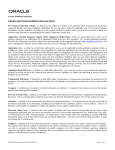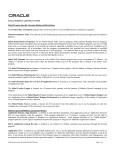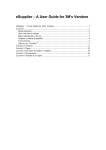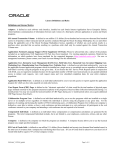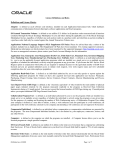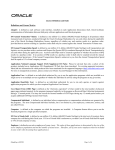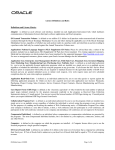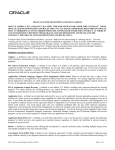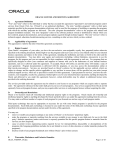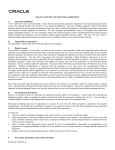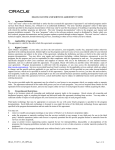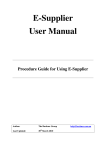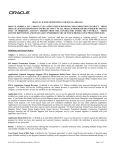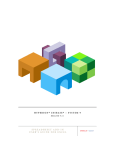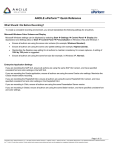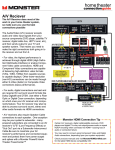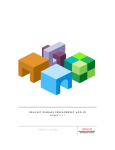Download License Definitions and Rules
Transcript
License Definitions and Rules Crystal Ball Program Definitions and License Metrics Application User: is defined as an individual authorized by you to use the applicable licensed application programs which are installed on a single server or on multiple servers regardless of whether the individual is actively using the programs at any given time. If you license the Oracle Self Service Work Request option in conjunction with Oracle Enterprise Asset Management, you are required to maintain licenses for the equivalent number of Application Users licensed and you are granted unlimited access to initiate work requests, view work request status and view scheduled completion dates for your entire employee population. Application Users licensed for Oracle Order Management are allowed to manually enter orders directly into the programs but any orders entered electronically from other sources must be licensed separately. For Oracle Sourcing, Oracle iSupplier Portal, Oracle Services Procurement, PeopleSoft eSupplier Connection, PeopleSoft Strategic Sourcing and JD Edwards Supplier Self Service programs, use by your external suppliers is included with your application user licenses. Applications National Language Support (NLS) Supplement Media Packs: Please be advised that only a subset of the products included on an Applications NLS Supplement Media Pack have been translated. For existing supported customers, MetaLink has information on which products have been translated for the supported languages (http://metalink.oracle.com). For new or unsupported customers, please contact your Oracle Account Manager for this information. Faculty User: is defined as an active teaching member of the faculty for an accredited academic institution; such user may only use the programs for academic and non-commercial use. Full Time Equivalent (FTE) Student: is defined as any full-time student enrolled in your institution and any part-time student enrolled in your institution counts as 25% of an FTE Student. The definition of "full-time" and "part-time" is based on your policies for student classification. If the number of FTE Students is a fraction, that number will be rounded to the nearest whole number for purposes of license quantity requirements. Learning Credits: may be used to acquire education products and services offered in the Oracle University online catalogue posted at http://www.oracle.com/education under the terms specified therein. Learning credits may only be used to acquire products and services at the list price in effect at the time you order the relevant product or service, and may not be used for any product or service that is subject to a discount or a promotion when you order the relevant product or service. The list price will be reduced by applying the discount specified in your order. Notwithstanding anything to the contrary in the previous three sentences, learning credits may also be used to pay taxes, materials and/or expenses related to your order; however, the discount specified above will not be applied to such taxes, materials and/or expenses. Learning credits are valid for a period of 12 months from the date your order is accepted by Oracle, and you must acquire products and must use any acquired services prior to the end of such period. You may only use learning credits in the country in which you acquired them, may not use them as a payment method for additional learning credits, and may not use different learning credits accounts to acquire a single product or service or to pay related taxes, materials and/or expenses. Learning credits are non-transferable and non-assignable. You may be required to execute standard Oracle ordering materials when using learning credits to order products or services. Oracle Finance Division Contract: is a contract between you and Oracle (or one of Oracle’s affiliates) that provides for payments over time of some or all of the sums due under your order. Program Documentation: is defined as the program user manual and program installation manuals. Technical Reference Manuals: Technical Reference Manuals (“TRMs”) are Oracle’s confidential information. You shall use the TRMs solely for your internal data processing operations for purposes of: (a) implementing applications programs, (b) interfacing other software and hardware systems to the applications programs and (c) building extensions to applications programs. You shall not disclose, use or permit the disclosure or use by others of the TRMs for any other purpose. You shall not use the TRMs to create software that performs the same or similar functions as any of Oracle products. You agree: (a) to exercise either at least the same degree of care to safeguard the confidentiality of the TRMs as you exercise to safeguard the confidentiality of your own most important confidential information or a reasonable degree of care, whichever is greater; (b) to maintain agreements with your employees and agents that protect the confidentiality and proprietary rights of the confidential information of third parties such as Oracle and instruct your employees and agents of these requirements for the TRMs; (c) restrict disclosure of the TRMs to those of your employees and agents who have a "need to know" consistent with the purposes for which such TRMs were disclosed; (d) OPN.Crystal Ball.Partner.OLSAdef.v062309.USA.doc Page 1 of 3 maintain the TRMs at all times on your premises; and (e) not to remove or destroy any proprietary or confidential legends or markings placed upon the TRMs. Oracle shall retain all title, copyright and other proprietary rights in the TRMs. TRMs are provided to you "as-is" without any warranty of any kind. Upon termination, you shall cease using, and shall return or destroy, all copies of the applicable TRMs. Technical Support: For purposes of the ordering document, technical support consists of annual technical support services you may have ordered for the programs. If ordered, annual technical support (including first year and all subsequent years) is provided under Oracle’s technical support policies in effect at the time the services are provided. The technical support policies, incorporated in this agreement, are subject to change at Oracle’s discretion; however, Oracle policy changes will not result in a material reduction in the level of services provided for supported programs during the period for which fees for technical support have been paid. You should review the policies prior to entering into the ordering document for the applicable services. You may access the current version of the technical support policies at http://oracle.com/contracts. Technical support is effective upon the effective date of the ordering document unless otherwise stated in your order. If your order was placed through the Oracle Store, the effective date is the date your order was accepted by Oracle. Software Update License & Support (or any successor technical support offering to Software Update License & Support, “SULS”) acquired with your order may be renewed annually and, if you renew SULS for the same number of licenses for the same programs, for the first and second renewal years the fee for SULS, will not increase by more than 5% over the prior year’s fees. If your order is fulfilled by a member of Oracle’s partner program, the fee for SULS for the first renewal year will be the price quoted to you by your partner; the fee for SULS for the second renewal year will not increase by more than 5% over the prior year's fees. If you decide to purchase technical support for any license within a license set, you are required to purchase technical support at the same level for all licenses within that license set. You may desupport a subset of licenses in a license set only if you agree to terminate that subset of licenses. The technical support fees for the remaining licenses will be priced in accordance with the technical support policies in effect at the time of termination. Oracle’s license set definition is available in the current technical support policies. If you decide not to purchase technical support, you may not update any unsupported program licenses with new versions of the program. Custom Application Program License Definitions and Rules Custom Suite User: is defined as an individual authorized by you to use the application programs included in the applicable Custom Applications Suite which are installed on a single server or on multiple servers regardless of whether the individual is actively using the programs at any given time. Enterprise Application Program License Definitions and Rules Enterprise $M in Revenue: Enterprise $M in Revenue is defined as one million U.S. dollars in all income (interest income and non interest income) before adjustments for expenses and taxes generated by you during a fiscal year. The value of these program licenses is determined by the amount of Enterprise $M Cost of Goods Sold. For these program licenses, the licensed quantity purchased must, at a minimum, be equal to the amount of Enterprise $M Cost of Goods Sold as of the effective date of your order. If at any time the amount of Enterprise $M Cost of Goods Sold exceeds the licensed quantity, you are required to order additional licenses (and technical support for such additional licenses) such that the amount of Enterprise $M Cost of Goods Sold is equal to or less than the licensed quantity. You are not entitled to any refund, credit or other consideration of any kind if there is a reduction in the amount of Enterprise $M Cost of Goods Sold. In addition, each year 90 days before the anniversary date (defined as the day and month of the ordering document effective date), you are required to report to Oracle the number of Enterprise $M Cost of Goods Sold as of such date. Term Designation If your program license does not specify a term, the program license is perpetual and shall continue unless terminated as otherwise provided in the agreement. 1, 2, 3, 4, 5 Year Terms: A program license specifying a 1, 2, 3, 4 or 5 Year Term shall commence on the effective date of the order and shall continue for the specified period. At the end of the specified period the program license shall terminate. 1 Year Hosting Term: A program license specifying a 1 Year Hosting Term shall commence on the effective date of the order and shall continue for a period of 1 year. At the end of the 1 year the program license shall terminate. A program license specifying a 1 Year Hosting Term may only be used for providing internet hosting services. OPN.Crystal Ball.Partner.OLSAdef.v062309.USA.doc Page 2 of 3 1 Year Oracle Hosted Term: A program license specifying a 1 Year Oracle Hosted Term shall commence on the effective date of the order and shall continue for a period of 1 year. At the end of the 1 year the program license shall terminate. A program license specifying a 1 Year Oracle Hosted Term must be hosted by Oracle.com via Computer and Administration services. 1 Year Subscription: A program license specifying a 1 Year Subscription shall commence on the effective date of the order and shall continue for a period of 1 year. At the end of the 1 year the program license shall terminate. You are responsible for ensuring that the following restrictions are not violated: • Informatica PowerCenter and PowerConnect Adapters may not be used on a standalone basis or as a standalone ETL tool. The Informatica PowerCenter and PowerConnect Adapters may be used with any data source provided the target(s) are: (i) the Oracle Business Intelligence applications programs (excluding Hyperion Enterprise Performance Management Applications), (ii) the underlying platforms on which the Oracle Business Intelligence Suite Enterprise Edition Plus program, Oracle Business Intelligence Standard Edition One or associated components of those Business Intelligence applications programs run, or (iii) a staging database for any of the foregoing. Informatica PowerCenter and PowerConnect Adapters may also be used where the Oracle Business Intelligence applications programs (excluding Hyperion Enterprise Performance Management Applications) are the source and non-Oracle Business Intelligence application programs are the target, provided, that users do not use Informatica PowerCenter and PowerConnect Adapters to transform the data. • Hyperion Data Integration Management, Hyperion Data Integration Management Team Based Development, and the Hyperion Data Integration Management Adapters for SAP BW, SAP R3, PeopleSoft and Siebel are licensed by Computer. Each Computer license is limited to support the use of up to 8 CPUs and each Computer license must be licensed in increments of 8 CPUs. Each core is recognized as a CPU. For computers that have more than 8 CPUs, additional Computer licenses must be purchased based upon the amount of CPUs that you are using. For example, if you are using Hyperion Data Integration Management on 12 CPUs, you need to purchase 2 Computer licenses; if you are using Hyperion Data Integration Management on 17 CPUs, you need to purchase 3 Computer licenses. These programs may be used solely in connection with moving data into and out of a Hyperion Data Store(s) (data/metadata repository(ies) delivered with the Hyperion programs.) These programs may not be used to extract data from a non-Hyperion Data Store(s) to load a custom data warehouse (a data warehouse not built solely from data from a Hyperion Data Store(s). The Hyperion Data Integration Management Computer license allows for such program to 1) connect to the following relational databases only: Oracle, Sybase, IBM DB2, MS SQL Server and 2) source from and write to an unlimited number of flat file/XML files. Hyperion Data Integration Management Adapters for SAP BW, SAP R3, PeopleSoft and Siebel must be licensed separately to allow Hyperion Data Integration Management to connect to these additional sources. • Application licensing prerequisites as specified in the Applications Licensing Table which may be accessed at http://oracle.com/contracts. • The number of Hyperion program option licenses must match the number of licenses of the associated Hyperion program. • The license for the Hyperion Planning Plus program includes a limited use license for the Hyperion Essbase Plus, Hyperion Financial Reporting, Hyperion Web Analysis and Oracle Data Integrator - Target Database programs. Such limited use license means that the Hyperion Essbase Plus, Hyperion Financial Reporting, Hyperion Web Analysis and Oracle Data Integrator - Target Database programs may only be used to access data from the Hyperion Planning Plus program. Specifically, the Hyperion Essbase Plus program cannot be used to create Essbase cubes that do not contain data used by the Hyperion Planning Plus program and the Aggregate Storage option component of the Hyperion Essbase Plus program may not be used. • The license for the Hyperion Profitability and Cost Management program includes a limited use license for the Hyperion Essbase Plus, Hyperion Financial Reporting, Hyperion Web Analysis and Oracle Data Integrator - Target Database programs. Such limited use license means that the Hyperion Essbase Plus, Hyperion Financial Reporting, Hyperion Web Analysis and Oracle Data Integrator - Target Database programs may only be used to access data from the Hyperion Profitability and Cost Management program. Specifically, the Hyperion Essbase Plus program cannot be used to create Essbase cubes that do not contain data used by the Hyperion Profitability and Cost Management program and the Aggregate Storage option component of the Hyperion Essbase Plus program may not be used. • The license for the Hyperion Data Relationship Management program includes a limited use license for both the WebLogic Server Standard Edition and BPEL Process Manager programs. Such limited use license means that the WebLogic Server Standard Edition and BPEL Process Manager programs may only be used to enable workflow functions in order to process requests within the Hyperion Data Relationship Management program. OPN.Crystal Ball.Partner.OLSAdef.v062309.USA.doc Page 3 of 3



